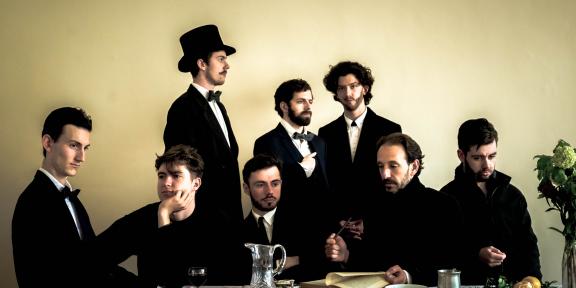Synopsis
In September 1871, Paul Verlaine, an established poet living with his wife’s parents’, took seventeen-year-old Arthur Rimbaud under his wing, inviting him to move into the family home in Paris. It was not long before Verlaine fell under the spell of the talented and irreverent teenager. The two became lovers, and their violent and hedonistic relationship would destroy Verlaine’s reputation, torture his wife Mathilde, and alienate his friends and colleagues. At the same time, it was perhaps only with Rimbaud that Verlaine was ever truly free. Whether the two of them knew it or not, their meeting would change the course of French poetry forever.
At once dark, comical, and passionate, ‘Arseholes’ tells the story of a love affair like no other. You will be taken on a journey through nineteenth-century French family life, absinthe-fuelled poetry readings at the Hôtel des Étrangers, the rags and riches of Victorian London, and a hotel room in Brussels laid ready for a suicide, the whole layered with saucy dialogue, French music, and period costumes.
The People
The play is written and directed by Dr Julia Hartley, artistic director of Ionian Productions, a theatre company committed to cultural exchange, founded by Oxford University Modern Languages students in 2009 with the intention of introducing Oxford audiences to European theatre and literature. The play's cast includes two scholars of nineteenth-century French literature, Dr Stephen Goddard and Professor Seth Whidden, and has generally benefited from Professor Seth Whidden's expertise as a Rimbaud and Verlaine specialist.
Professor Seth Whidden writes: "It is precisely for the blurred line between life and work that Rimbaud and Verlaine continue to fascinate readers and students, and the reason for a play like Julia Hartley’s Arseholes. Indeed, the play’s depiction of the poets’ torrid relationship raises numerous questions that are as relevant today as they were in the early 1870’s: Where does poetic inspiration come from? To what extent can, or should, our understanding of someone’s life influence our appreciation of her or his artistic production? Rimbaud and Verlaine hint at this question themselves in ‘Sonnet du trou du cul’ (Sonnet to an Arsehole): How can we possibly approach a sonnet from an arsehole (or from a pair of arseholes)? What would it mean to avert our gaze and avoid it?"
